Articles about reggae music, reviews, interviews, reports and more...
Inna De Yard live at Philharmonie de Paris

Inna De Yard live at Philharmonie de Paris
A magnificent evening of live acoustic reggae, delivered with passionate feeling.
Sampler
Inna De Yard’s performance at the Philharmonie de Paris on April 22, formed the centrepiece of the ‘Jamaican Weekend,’ a fitting aural counterpart to the ambitious Jamaica Jamaica! exhibition, curated by Seb Carayol for the grand opening of the new Cite de la Musique arts space, located on the northeast periphery of the French capital city. On the eve of an election that would eliminate all but the far-right and centre-right candidates for President (both pushing for tighter border controls or even expulsions in the wake of the latest terrorist attack), there are particular resonances for the Cite de la Musique’s overarching policy of inclusiveness, mirroring the underlying theme of Jamaica Jamaica!, which points to the inspiring creativity of black Jamaicans and the resilient nature of the African diaspora, which endures despite centuries of hardship and injustice; such themes are constantly and subtlely emphasised throughout the magnificent evening with Inna De Yard, a united team of countercultural misfits whose Rastafari focus appears as the under-acknowledged conscience of the Jamaican nation, and indeed, humanity at large.
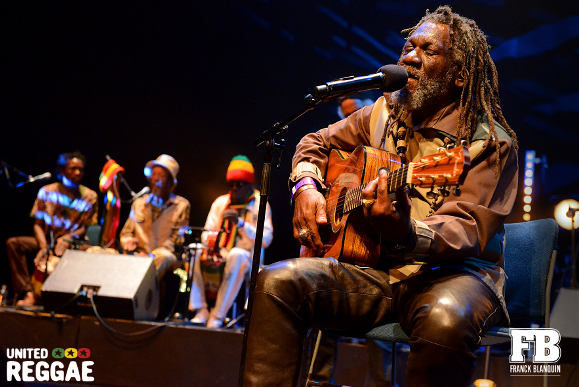
It was evident that most of the capacity audience at the smaller of the Cite de la Musique’s concert halls were familiar with the saga of Inna De Yard, as most of United Reggae’s readership will be. Its genesis dates back to the dawning of the new millennium, when Winston McAnuff sparked the concept of an acoustic reggae album, bringing the idea to Nicolas Maslowski and Romain Germa of Makasound, who were then re-issuing gems from Winston’s back catalogue. Operating out of ace guitarist Earl ‘Chinna’ Smith's front yard in a borderline Kingston neighbourhood, over a number of years, back-to-basics Inna De Yard acoustic reggae albums were cut with luminaries such as Kiddus I, the Congos, Junior Murvin, Linval Thompson, the Viceroys and the Mighty Diamonds, as well as upcoming talent such as the sing-jay and drummer Derajah, and McAnuff's son Matthew, backed only by Chinna’s lilting guitar lines and an underpinning of nyabinghi percussion. The series lasted long and had a core roots following, until Makasound succumbed to the pressures of falling physical sales, sparked largely by unauthorised internet downloads. But when Jamaica Jamaica! was in its planning stages, a request from Seb Carayol saw the Inna De Yard project reborn for Chapter Two, the bastard offspring of Makasound. Even though Chinna opted out of the new incarnation, The Soul of Jamaica album was a veritable triumph, delivered in a kind of 3D sense-surround, with a range of veterans and newcomers. All of which augured well for the concert, which generated a lot of feverish anticipation.
Unlike the venues of London’s Southbank Centre, whoever designed the performance halls at the Cite de la Musique had the good sense to keep the ground level of the smaller venue free of chairs. This means that more people can occupy the space, and most of them can dance when they want to (revealing a serious failing at the Queen Elizabeth Hall, for instance, and other venues of a similar character).
Due to the limitations of public transportation, I reached the place a few minutes late and found the capacity crowd already swaying in time to Kush McAnuff's spirited delivery of “Black To I Roots,” aided and abetted by an expressive trombone from Caron McGibbon (I missed an opening number from Var, titled “Hard Road”). Then Kush was back to his nyabinghi rhythm as Kiddus I stepped up to deliver “Survive” from the new album.
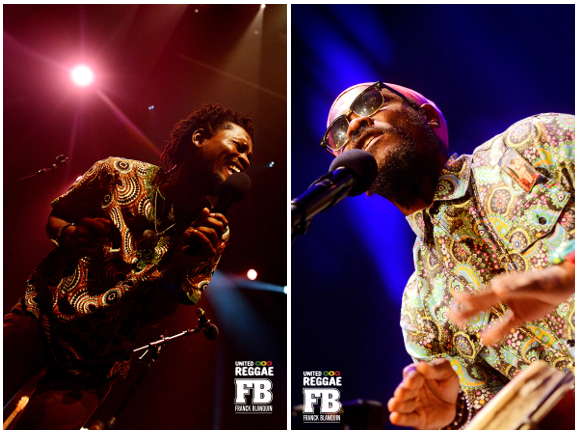
It was already evident that the musicianship was a pleasing blend of the tight and the loose; in comparison to the ‘Jamaica Review’ gala of the night before, which saw Jah9, Brigadier Jerry, a livid Johnny Osbourne and potty-mouthed Lee Perry all backed by the Homegrown Band with clinical precision, Inna De Yard’s pervasive delivery was relaxed, but heavy on feeling. There was a pleasing roughness around the edges, allowing for a good degree of improvisation and playfulness; the mixing engineer had a tough task at hand and did an admirable job. If there were moments when Robbie Lyn’s piano chords were occasionally wafting low beneath a rising tide of nyabinghi beats, anything amiss was soon righted, and Pot A Rice’s propulsive semi-acoustic bass was always there to guide us, complimented by understated guitar lines from Bo-Pee Bowen, and the throbbing nyabinghi heartbeat of the wall of conga drums. In general, though, the acoustic nature of things meant that our vocal protagonists were totally exposed, and each displayed a particular character when in the hot seat.
Soon, Derajah stepped up to deliver a rousing rendition of vintage Inna De Yard thriller “Ooh Yeah Yah,” enlisting the audience for a bit of call-and-response while Robbie Lyn blew a mean melodica counterpart, and then Cedric Myton flapped in like a bird for a great take of “Youth Man,” which the Congos had cut for CBS France way back at the end of the 1970s. Very much at home in Paris, Cedric altered the lyrics a bit to direct his lines to those of African descent in the audience, reminding that France’s black population has the same worth, and the same legal, social and human rights as any other person in the country, with the urgency of the trombone solo seeming to emphasize that very point.
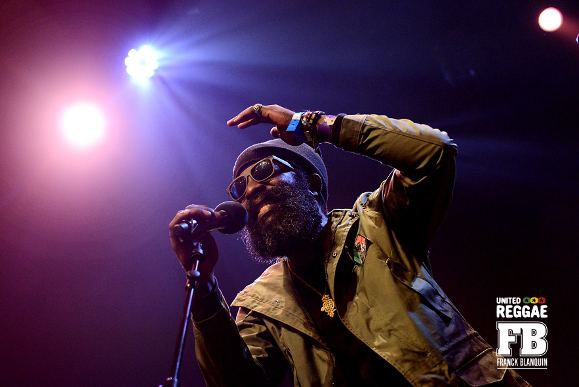
Winston McAnuff has been performing and recording in France since the 1980s and is also very much at home here. So when he and Derajah came over to bring forth “Stone” as a duo (built around the biblical phrase, “The stone that the builder refuse will be the head cornerstone”), the audience let everyone know that the message was again received loud and clear. You could see the delight on Winston’s face being greeted with this kind of deserved hero’s welcome, and the band’s energy continued to lift ever higher.
Var of the militant Rasta group Pentateuch somehow shifted things into another direction with “Give Me Your Love,” which he directed at the ladies in the house. If such platitudes may have seemed a bit frivolous compared to what proceeded it, the crowd still ate it up, evidently liking the contemporary vibe of the track. And keeping with the upbeat pace, despite the far more serious and spiritual content of the lyrics, Kiddus’ “Graduation In Zion” was also greeted by rousing cheers, Bo-Pee’s intricate guitar backing providing an extra layer of musicality.
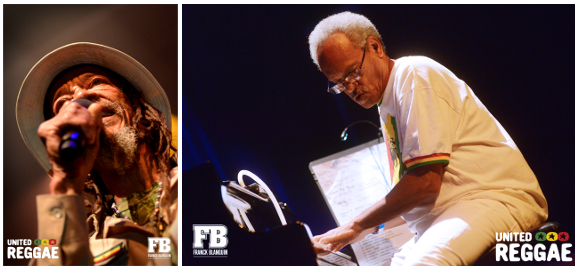
When the accordionist Fixi then appeared on stage, it was to help deliver one of the evening’s pleasant surprises, in the form of a non-standard take of Winston McAnuff's mid-1970s gem, “Malcolm X,” with Winston here accompanying himself on acoustic guitar and Cedric Myton providing backing vocals too. Then came an odd tale from Cedric about Lucifer’s initial act of insurrection, apparently called “Rebellion In Heaven.”
Derajah kept us thinking of demonic elements with some spoken words about the link between cellphone use and low sperm counts, given as a prelude to “Ghetto Youths Stop From Fight,” and then Var was back for an excellent take of his “Crime” epic, which reminds that Jamaica’s crime problems have their roots in the country’s unequal social divides, a mournful solo from Bo-Pee providing more musical emphasis. Then came another surprise moment, when Robbie Lyn gave a piano intro to a jazzy Kiddus I rendition of Edith Piaf’s “If You Love Me,” mutated from the album he cut with the Homegrown band for Iroko, to more hearty applause. Then Winston and Fixi were back for “Ras Child,” one of Winston’s autobiographical numbers, delivered with suitable aplomb.
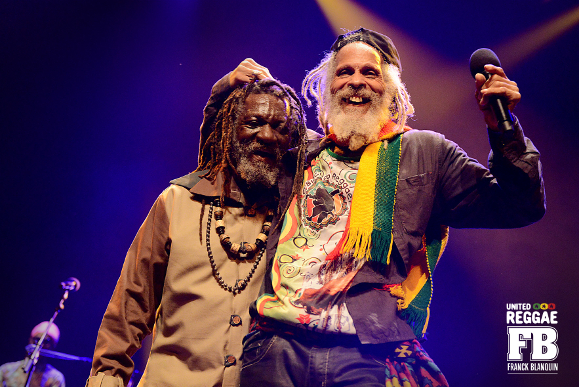
When Cedric joined Winston on stage, the next number was ‘wheeled’ by Cedric before it even began. He ‘wheeled’ it again once we understood that it was the Congos’ landmark “Fisherman,” cut at Lee Perry’s Black Ark some 40 years ago. The band extended it into a lively dub workout, and then Cedric gave another surprise in delivering Watty Burnett’s baritone lines at the end, about Quajupet the collie man. And after a very messy introduction to the cast by Cedric, the band filed off the stage to tumultuous applause, which continued to build and build and build as the stage lay empty.
Unlike the ‘instant encores’ that so often occur in London, with obligatory, half-hearted songs tacked on at the end of mediocre sets, this was an actual encore, demanded by the crowd and delivered by the band with love. It began with Bo-Pee alone in the spotlight with his acoustic guitar, to impart his “Thanks And Praises,” the closing track from Soul of Jamaica (complete on the night with crickets, bird calls and barking dog ambient sounds, brought in by the engineer from the original backing track. To, a somewhat gratuitous singalong version of “Rivers Of Babylon,” played with a kind of delirious glee. And then came another of the evening's unexpected moments, when Derajah and Var stood on either side of Winston McAnuff to deliver “Be Careful,” the much-loved track by his absent son Matthew, who fell victim to a senseless murder shortly after recording it for Makasound. You could see the shock and disbelief that are still etched into Winston’s face, the moment he heard of the tragedy so obviously still affecting him. It gave the lyrics an extra layer of meaning, bringing home the reality of which they so cogently spoke.
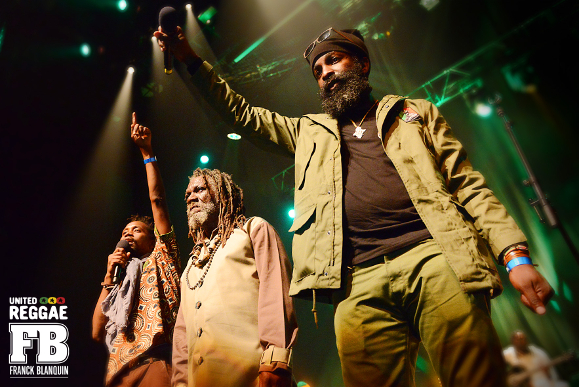
With emotions running so high in the house as the band once again left the stage, there was no way that the crowd would simply allow them to leave it at that. And once again, the final encore was truly a command performance. And again it took the form of a musical surprise, when Winston McAnuff came back with his acoustic guitar, and Kiddus on the nyabinghi bass drum, for a non-standard take of “Knocking On Heaven’s Door.” As the auditorium lights came on, everyone filed out of the venue on a total high, steaming into the warm midnight air with an uplifted energy.
Overall, the return of Inna De Yard to Paris was a total triumph. With nowhere to hide and nothing but voice, hand drums and a few acoustic instruments, they gave us what towering rock bands and full-scale orchestras so often fail to deliver, which is meaningful music with a message, played in its rawest and most honest form. They will be back on the road in May, July and August, so make sure to catch them in this present configuration, and go straight out and pick up the album if you have not done so already; the Jamaica Jamaica! exhibition runs until mid-August, and is also a must-see for all reggae fans.
Read more about this topic
Comments actually desactivated due to too much spams
Browse by categories
Recommended Articles
Latest articles
Recently addedView all
© 2007-2026 United Reggae. All Rights Reserved. Reproduction in whole or in part is prohibited. Read about copyright
Terms of use | About us | Contact us | Authors | Newsletter | A-Z

































































